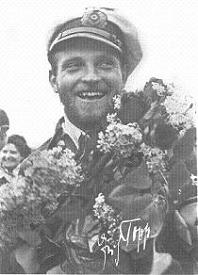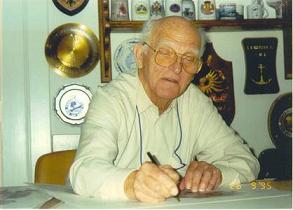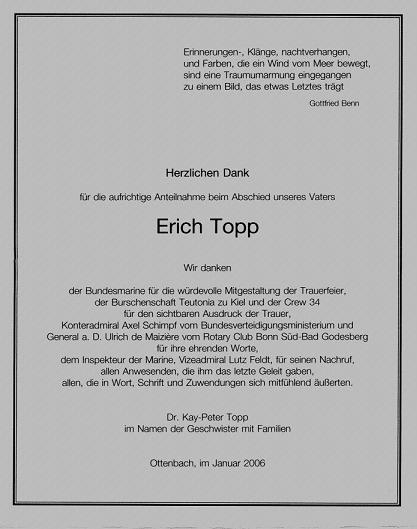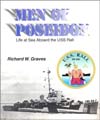A Visit with a U-Boat Ace: Erich Topp
by Craig McLean
July 2004
Note: Born in 1914, Fregattenkapitän (Captain) Erich Topp was the third-highest scoring ace in the German U-bootwaffe, or submarine force, during the Second World War, holding the prestigious Knight’s Cross with Oakleaves and Swords. He later served in postwar West Germany’s navy, rising to the rank of Rear Admiral, and worked closely with NATO during the Cold War. Today, 90, Topp lives with his son in Ottenbach, Germany.

Topp is welcomed back from a wartime patrol
Having first become acquainted with U-boat ace Erich Topp through Director Horst Bredow of the U-Boot-Archiv in Cuxhaven-Altenbruch, Germany, on the North Sea, we discussed several topics in letters before I met him in person at his home several years later. I had asked about his wartime patrols and Topp wrote back mentioning his memoirs, The Odyssey of a U-boat Commander: Recollections of Erich Topp. I hadn’t been aware of his book and quickly purchased a copy, reading it through with great interest. (Topp later autographed it to me using a saying he is quite fond of: “Enemies of yesterday are friends of today.”)

Topp signing posters at the U-Boot-Archiv in 1995.
I had also asked the Admiral about some of the many prominent figures he met during the course of the war. Topp met Grand Admiral Karl Dönitz before, during, and after the war of course. Dönitz had been the commander of the U-boat force, eventually of the entire Kriegsmarine (navy), and became the second and final head of state of the Third Reich when Adolf Hitler designated him to be his successor shortly before committing suicide in Berlin in April 1945. Topp later told me that it was Dönitz who had convinced him to join the U-boat force, well before war broke out, while Topp was still a young officer in the regular navy. Topp also met Hitler on three occasions, having been summoned each time to Führer Headquarters to be decorated and then remaining after to dine with him as part of a small group of invited guests. I’ve seen a short film clip of Topp’s first visit to Hitler’s headquarters, which was a part of a larger documentary about the U-boat war. In it, another U-boat commander was also present and salutes and handshakes were exchanged, whereupon Hitler presented the Oakleaves to the Knight’s Cross to each man in turn.
Writing me in 1998, Topp said, “Dönitz and Hitler…I met them both; but not enough to have a final encompassing view.” He went on to say that “Dönitz certainly has been a good leader of his submariners, but he continued the ‘Battle of the Atlantic,’ when of 4 boats 3 didn’t come back, when the Allied had broken our codes, when their radar on board of planes [was] controlling the Atlantic, when their convoys were protected by High Frequency Direction Finders on board of their destroyers, and so on.” Topp added, “Not to mention Hitler--he was a criminal--I am criticizing both--it is a wide field.”
I eventually became quite familiar with what Topp had written in his memoirs. During his first visit to Führer Headquarters in April 1942, Hitler thanked him for his missions in the Atlantic and invited Topp to join him and his other guests for lunch, which he did. Topp wrote that, as a soldier, he liked what Hitler had to say during the meal about making life easier for Germany‘s fighting men, as well as removing anything that stood in the way of military success. But he remarked that Hitler had a habit of “verbal excesses” and of referring to other national leaders in particularly demeaning terms; Churchill was the alcoholic and FDR the paralytic. Personally, Topp felt it beneath Hitler as a head of state to make such characterizations of others. (OUC, p. 97)
During Topp’s final visit to the “Wolf’s Lair” headquarters, he pointed out that Hitler was lecturing those present about new secret weapons that would have a positive influence on the outcome of the war for Germany. Topp was impressed but remained skeptical (OUC, p.100-101), as it was mid-1943 and it seemed to him that fortunes were already turning irrevocably against Germany by that time. A high ranking government official later gave a more detailed presentation that Topp attended concerning some of the new air weapons, such as the jet and the V-1 and V-2 rockets, and the effect they should have on the war. A Luftwaffe officer present leaned toward Topp and commented, “Exaggerated, completely exaggerated! (OUC, p. 101)” When the briefing turned to the new type XXI electro-boat, the world’s first true submarine, and the impact it would have, Topp turned to the air force officer and added his own, “Completely exaggerated! (OUC, p. 101)” Topp later had an opportunity to command a type XXI U-boat (U-2513) and told me that it was truly a remarkable submarine, but that it simply came too late to alter the course of the war.
When I visited Admiral Topp at his home in Oberwinter, near Remagen, in November of 2000, he greeted me at his front door in a gray suit and snappy bow tie, and had a ready smile. I was impressed by his friendliness and also by the beautiful view of his village and the Rhine River from the large living room window which overlooked both from atop a wooded hillside. We visited for several hours, having a fascinating discussion related to some of his wartime experiences.
When I asked what had been his worst experience during the war, Topp described a patrol as commander of a small type IIC coastal submarine, the U-57. During the second half of 1940, U-57 put to sea from Kiel into the North Sea area and early in the patrol came under surprise attack from a British aircraft. U-57 dove to escape, but one of the two diesel engines had been knocked out of commission from bombs dropped. Consensus was to continue the patrol anyway, even with reduced speed, and eventually a flotilla of ships was spotted. Topp ordered a spread of three torpedoes to be fired and U-57 then dove to escape the British escorts which promptly took up depth-charging runs against the German submarine. For more than 24 hours, the escorts sought to blow U-57 apart, and the crew had already been forced to resort to their breathing apparatus as the oxygen became depleted. Topp confided to me that he had felt they all might well meet their end very soon, but miraculously the depth-charging finally ceased and the escorts departed. Nevertheless, U-57 had come to rest on the bottom, and was very nearly unable to extricate itself from a combination of the mud’s hold and the weight of the water taken on. U-57, of course, did finally pull free and manage to surface again. The electric batteries were recharged, repairs were made where possible, and another convoy was soon located. A final spread of the last two torpedoes was fired at the end-most tanker, it exploded in a ball of flame and smoke, and this time Topp’s boat was able to dive and elude a pursuing escort more easily. Returning to port down the Elbe River in Germany, U-57 was running on the surface, after dark, but had all her lights on. Even so, a large Norwegian freighter (the Rona) collided with the German boat and the smaller vessel quickly sank. “I lost six of my crew. That for me was my worst experience of the war,” Topp admitted. It must have been particularly disheartening to have survived such a harrowing patrol, sinking an enemy ship, only to be rammed accidentally in the relative safety of German home waters.
Topp eventually spent much of his wartime career, and saw most of his successes, as commander of a type VIIC U-boat, the U-552. Also known as “Atlantic boats,” the Type VII was the single most prolific type German sub produced during the war. I mentioned having seen one documentary where Topp spoke of the wife of one of his crew members once telling him that whenever things became especially dangerous aboard the boat, her husband had told her he would “put himself into the captain’s pocket,” meaning that he would place all his trust in Topp’s abilities and skill. Topp smiled at that, nodding, and told me, “That was my navigator!” The navigator was Franz Säck, who Topp went on to say eventually took command of his own U-boat, the U-251. Just weeks from the end of the war, Topp and Säck were both putting to sea when their boats came under Allied air attack not far from port. The U-251 was hit and began sinking. As German surface ships hurried to rescue as many of the crew as possible, Topp said he called out from his conning tower to see if Säck was all right. Säck shouted and waved back that he was okay. Such was the camaraderie of the men in the U-boat force!
Topp told me he loved the sea. When the surface was especially rough, it was necessary to dive to more than 100 feet to escape the heavy turbulence, but the electric batteries normally could not be expended in such a way just to obtain a smoother ride. Electric batteries had limited use before needing to be recharged on the surface, and one never knew when submerged escape from attacking enemy ships or aircraft might suddenly become necessary. Topp also told me of a tour he had been invited to make, many years after the war, on board a U.S. nuclear sub in Florida. "My boat was 700 tons, but this submarine was 8,000 tons. Can you imagine? 8,000 tons!" The rapid technological advances worldwide in so many different weapon systems (land, sea, and air) during the second half of the Twentieth Century certainly were remarkable, but the roots for many of these could be traced back to the Second World War.
When it neared time for me to leave, Admiral Topp was gracious enough to sign several books that I had brought along for some friends of mine. He also signed one for me: "Für Craig McLean in maritimer Verbundenheit. Erich Topp, 18.11.00." He asked if I understood Verbundenheit, and I said that I believed it meant solidarity. He smiled and said yes. "In nautical solidarity." A touching sentiment between a U-boat veteran and a somewhat-recently retired American infantry soldier, I felt.
My host drove me back to Remagen personally and made sure I had secured a hotel room for the night, directly across the street from the train station, adding that I should phone him at home if I needed anything at all before I departed the following morning. I assured him that I would. Topp then wished me a good train ride back to Cuxhaven and a good flight eventually back to the U.S. I thanked the Admiral for everything and we parted company with a warm handshake. I believe I experienced at least a glimpse of the same Erich Topp during my visit that his crew knew and relied on so many decades ago during the critical and costly Battle of the Atlantic. A fine gentleman.
In maritimer Verbundenheit, Admiral Topp!
Update - Erich Topp passed away on 26 Dec 2005

The funeral notice for Erich Topp
Sources:
- Erich Topp
- The Odyssey of a U-boat Commander: Recollections of Erich Topp by Erich Topp, translated by Eric C. Rust, (Praeger)
Suggested Further Reading:
- The Odyssey of a U-boat Commander: Recollections of Erich Topp by Erich Topp, (Praeger)
- Hunt and Kill: U - 505 and the U-boat War in the Atlantic by Theodore Savas, (Savas Beatie)
- U-Boats: The Illustrated History of the Raiders of the Deep by David Miller, (Brassey’s)
- U-Boote: 1935-1945, The History of the Kriegsmarine U-boats by Jean-Philippe Dallies-Labourdette, (Histoire and Collections)
This article was published on 17 Feb 2007.
Buy this title at amazon.com |
Books dealing with this subject include
|


